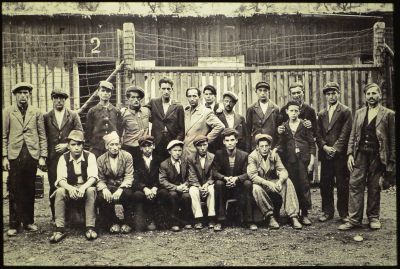Forced labour in the Völklinger ironworks

In 1994 the Völklingen ironworks in the Saarland was inscribed into the list of world cultural heritage sites. Today almost 400.000 visitors come here every year, attracted not only by the site but also by the changing exhibitions. But none of them will ever find any indication on the huge site of the former Röchling ironworks, that around 70 years ago 6000 men and women from Poland were forced to work here under terrible conditions during the Second World War. The forced labourers came from different countries in Europe.
They were taken to the Third Reich in the so-called “Röchling transports”, named after Hermann Röchling, the owner of the Völklingen mill and the man who put forward the idea for the deportations from all over Europe. The workers were housed in inhuman conditions in Etzenhofen, where today there is only a huge rock with an inscription to remind us of the terrible conditions in the barracks. A total of 20 million forced labourers, of which around 4 million were Poles, worked as slaves in the Third Reich and the occupied territories.
Additional historic information
- 1873 The Völklingen mill is founded by Julius Buch
- 1881 The ironworks are taken over by Carl Röchling
- 1890 The "Röchling’sche Eisen- und Stahlwerke" is the largest manufacturer of iron girders in Germany
- 1898 The mill is taken over by Hermann Röchling
- 1914-18 First World War. Manufacture of war goods (over 600 forced labourers)
- 1935-39 The mill is extended and modernised
- 1939-45 Second World War. Manufacture of war goods (around 6 000 forced labourers)
- 1943 Erection of a prison camp
- 1945 No war damage during the Second World War
- 1952 New production record
- 1956 The mill is returned to the Röchlings
- 1969 Another high point of production
- 1993 Bankruptcy
- 1994 UNESCO title
Adam Gusowski